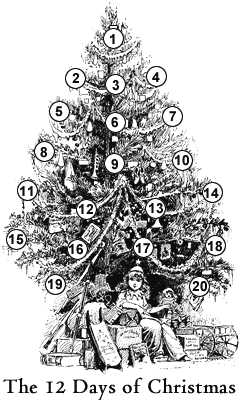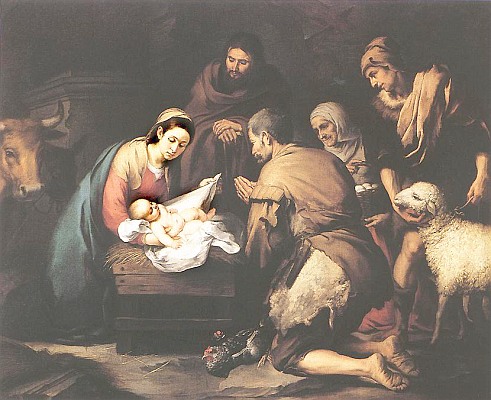Epiphany
HISTORY, TRADITIONS, CUSTOMSThe Church's celebration of Epiphany ("manifestation), the "twelfth night of Christmas," apparently originated in Egypt sometime during the third century, thus the Church's celebration of this feast predates even the celebration of Christmas itself.Epiphany is traditionally celebrated in honor of Christ's birth, of the adoration of the Magi, and of the baptism of Christ's (also celebrated on the first Sunday following Epiphany), three manifestations of the Lord's divinity.
Because the Magi came form the Orient, many of the traditional foods served on this day are spicy. Spice cake is often baked for dessert, and entrees may include curry powder or other pungent spices.
Several lovely family customs are associated with Epiphany. It is on Epiphany that the Christmas creche is finally completed, as the figures of the three wise men at last arrive at the crib. In many families, the wise men are moved a bit closer to the crib every day from Christmas Day until Epiphany. Also, recalling the gifts to the Infant Jesus, many families exchange small gifts.
A time-honored custom (especially in France) is the baking of a cake with a bean or trinket hidden inside. The person whose cake contains the bean is made king of the feast. Processions of robed and crowned "wise men" to the manger are fun for little ones, and provide them with an opportunity to think of a good deed that they can offer as a gift to Jesus.
The blessing of the home is also a popular Epiphany custom. using specially blessed chalk (your parish priest will bless the chalk, if you ask, or use the prayer of blessing below), many households mark their entrance door with the year and with the inscription CMB, the initial Caspar, Melchior and Balthasar, the names of the three wise man in legend. The inscription also stands for Christus Mansionem Benedicat, which means "Christ, bless this home." The popular form the inscription takes is 20+C+M+B+03. It remains above the doorway until Pentecost.
In England, Twelfth Night was traditionally celebrated with a drink called Lamb's Wool, made of cider or ale, with roasted apples and sugar and spices (see recipe below). It was the custom to bless apple trees on that night by pouring a libation of cider on them.
A common custom in many cultures, is the Epiphany cake containing a trinket or bean, the person who finds it in his piece becoming the king of the feast. Sometimes there are two trinkets, or one bean and one pea: one for a king and one one for a queen. In the royal courts of the later Middle Ages, these customs were very popular. Some believe these celebrations derived from pagan Roman customs associated with Saturnalia, which fell at around the same time as Christmas. If so, it can be seen as an example of "inculturation", or transforming pre-Christian customs and practices by giving them Christian significance. The Roman theme of the lordship of the feast was easily shifted to the Epiphany theme of kingship: that of Christ himself and of the Magi, or "Three Kings".
Different parts of Europe have different traditional recipes for the Epiphany cake -- from the almond-paste-filled pastry, the French "galette de Rois" topped by golden paper crown, to the British fruit-filled, iced and layered confection. Some bakeries feature these cakes during the holiday season. Following is a simple cake for busy families with small children.
Epiphany cake
This cake is unforgettable to children, and an opportunity to underscore the meaning of Epiphany. A cake studded with candy jewels like a crown, and/or topped by a golden paper crown can help young children understand the Epiphany as the recognition, by the Magi ("three Kings"), of the Infant Jesus as Christ the King.
The coin or bean in the cake is a pleasant tradition. The one who gets the coin or bean gets to wear the paper crown as king or queen of the feast -- and is has the "royal privilege" of writing the inscription over the door.
You will need a cake, homemade or store-bought. (If yours is a store-brought cake, you can make little slits in the layers before decorating the cake, and carefully insert the coin or bean.)
Icing, homemade or store-bought. You may wish to tint the icing yellow to suggest the gold for the crown. Use yellow food coloring.
Lots of decorations: multicolored gumdrops, jelly beans, chocolate kisses, gold and silver balls -- or whatever your children like to use for decoration.
A gold paper crown. (You can make one from gold wrapping paper or doilies, if you cannot easily find one to buy.)
Lamb's Wool
This Old English and Irish punch, which dates form the Middle Ages, probably gets its name from the wooly appearance of the flesh of the roasted apples floating in the cider.
6 baking apples, cored
2 tablespoons to 1/2 cup brown sugar
2 quarts sweet cider, or hard cider, or ale or a mixture of cider and ale
1/8 teaspoon nutmeg
1/4 teaspoon cinnamon
1/4 teaspoon ground ginger
Roast the apples in a baking pan at 450 degrees F. for about an hour, or until they are very soft and begin to burst. (An alternative and quicker procedure is to peel and boil the apples until they are very soft and flaky.) You may leave the apples whole, or break them up.
In a large saucepan, dissolve the sugar a few tablespoons at a time in the cider or ale, tasting for sweetness. Add the spices. Bring to a boil and simmer for 10 to 15 minutes. Pour the liquid over the apples in a large punch bowl, or serve in large heat resistant mugs.
Yield: About 8 one-cup servings
Let us pray. O Lord God, bless this creature chalk to make it helpful to man. Grant that we who use it with faith and inscribe with it upon the entrance of our homes may enjoy physical health and spiritual protection. Through Christ our Lord. Amen.House BlessingLord God of Heaven and Earth, who hast revealed thine only-begotten Son to every nation by the guidance of a star: Bless this house and all who inhabit it. Fill them with the light of Christ, that their love for others may truly reflect thy love. We ask this through Christ our Lord. Amen.The Scripture selections below are those given in the Lectionary for Mass for the Epiphany. We present the reading from Isaiah in two versions: in the poetic English of the King James Version, well known to English-speaking people because it was used by Georg Frederick Handel in his oratorio, Messiah; and from the New American Bible (U.S. Lectionary). The Epistle and Gospel passages are from the Revised Standard Version-Catholic Edition, acknowledged to be the most accurate of the contemporary English translations.Collect - Vigil Mass
May the splendor of your majesty, O Lord, we pray,
shed its light upon our hearts,
that we amy pass through the shadows of this world
and reach the brightness of our eternal home.
Through our Lord Jesus Christ, your Son,
who lives and reigns with you in the unity of hte Holy Spirit,
one God, for ever and ever. +Amen.
Collect - Mass during the Day
O God, who on this day
revealed your Only Begotten Son to the nations
by the guidance of a star,
grant in your mercy
that we, who know you already by faith,
may be brought to behold the beauty of your sublime glory.
Through our Lord Jesus Christ, your Son,
who lives and reigns with you in the unity of the Holy Spirit,
one God, for ever and ever. +Amen.
First Reading: Isaiah 60:1-6
Arise, shine; for your light has come, and the glory of the Lord has risen upon you. For behold, darkness shall cover the earth, and thick darkness the peoples; but the Lord will arise upon you, and His glory will be seen upon you. And nations shall come to your light, and kings to the brightness of your rising.
Lift up your eyes round about, and see; they all gather together, they come to you; your sons shall come from far, and your daughters shall be carried in the arms. Then you shall see and be radiant, your heart shall thrill and rejoice; because the abundance of the sea shall be turned to you, the wealth of the nations shall come to you. A multitude of camels shall cover you, the young camels of Midian and Ephah; all those from Sheba shall come. They shall bring gold and frankincense, and shall proclaim the praise of the Lord.
Responsorial Psalm 72: 1-2, 7-8, 10-11, 12-13
R. Lord, every nation on earth will adore you.
Give the king thy justice,
O God, and thy righteousness to the royal son!
May he judge thy people with righteousness,
and thy poor with justice!
R. Lord, every nation on earth will adore you.
In his days may righteousness flourish,
and peace abound, till the moon be no more!
May he have dominion from sea to sea,
and from the River to the ends of the earth!
R. Lord, every nation on earth will adore you.
May the kings of Tarshish and of the isles render him tribute,
may the kings of Sheba and Seba bring gifts!
May all kings fall down before him,
all nations serve him!
R. Lord, every nation on earth will adore you.
For he delivers the needy when he calls,
the poor and him who has no helper.
He has pity on the weak and the needy,
and saves the lives of the needy.
R. Lord, every nation on earth will adore you.
Second Reading: Ephesians 3:2-3a,5-6
You have heard of the stewardship of God's grace that was given to me for you, how the mystery was made known to me by revelation. Which was not made known to the sons of men in other generations as it has now been revealed to his holy apostles and prophets by the Spirit; that is, how the Gentiles are fellow heirs, members of the same body, and partakers of the promise in Christ Jesus through the gospel.
Gospel Reading - Matthew 2:1-12
Now when Jesus was born in Bethlehem of Judea, in the days of Herod the king, behold, wise men from the East came to Jerusalem, saying, "Where is the he who has been born king of the Jews? For we have seen his star at its in the East, and have come to worship him."
When Herod the kingheard this, he was troubled, and all Jerusalem with him; and assembling all the chief priests and the scribes of the people, he inquired of them where the Christ was to be born.
They told him, "In Bethlehem of Judea, for so it is written by the prophet: 'And you, O Bethlehem, in the land of Judah, are by no means least among the rulers of Judah; for from you shall come a ruler, who will govern my people Israel.'"
Then Herod summoned the wise men secretly and ascertained from them what time the star appeared; and he sent them to Bethlehem, saying, "Go and search diligently for the child; and when you have found him, bring me word, that I too may come and worship him."
When they had heard the king they went their way; and lo, the star which they had seen in the East went before them, till it came to rest over the place where the child was.
When they saw the star, they rejoiced exceedingly with great joy; and going into the house they saw the child with Mary his mother and they fell down and worshipped him.
Then, opening their treasures, they offered him gifts of god, frankincense, and myrrh.
And being warned in a dream not to return to Herod, they departed to their own country by another way.
Solemnity of the Lord's EpiphanyIn the following excerpt from the Directory on Popular Piety and the Liturgy we find descriptions of customs and traditions of this great feast of the Church -- many of which could be adapted (or revived) for use in Catholic families.118. Many traditions and genuine manifestations of popular piety have been developed in relation to the Solemnity of the Lord's Epiphany, which is of ancient origin and rich in spiritual content. Among such forms of popular piety, mention may be made of :
- the solemn proclamation of Easter and the principal dominical feasts; its revival in many places would be opportune since it served to make the connection between the Epiphany and Easter, and orientate all feasts towards the greatest Christian solemnity;
- the exchange of "Epiphany gifts", which derives from the gifts offered to Jesus by the three kings (cf. Mt 2,11) and more radically from the gift made to mankind by God in the birth of Emmanuel amongst us (cf. Is 7, 14; 9, 16; Mt 1, 23). It is important, however, to ensure that the exchange of gifts on the solemnity of the Epiphany retain a Christian character, indicating that its meaning is evangelical: hence the gifts offered should be a genuine expression of popular piety and free from extravagance, luxury, and waste, all of which are extraneous to the Christian origins of this practice;
- the blessing of homes, on whose lintels are inscribed the Cross of salvation, together with the indication of the year and the initials of the three wise men (C+M+B) [Caspar, Melchoir, Balshazzar], which can also be interpreted to mean Christus mansionem benedicat [Christ bless this home], written in blessed chalk; this custom, often accompanied by processions of children accompanied by their parents, expresses the blessing of Christ through the intercession of the three wise men and is an occasion for gathering offerings for charitable and missionary purposes;
- initiatives in solidarity with those who come from afar; whether Christian or not, popular piety has encouraged a sense of solidarity and openness;
- assistance to the work of evangelisation; the strong missionary character of the Epiphany has been well understood by popular piety and many initiatives in support of the missions flourish on 6 January, especially the "Missionary work of the Holy Child", promoted by the Apostolic See;
- the assignation of Patrons; in many religious communities and confraternities, patron saints are assigned to the members for the coming year.







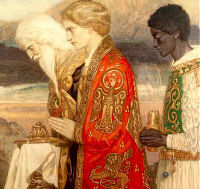
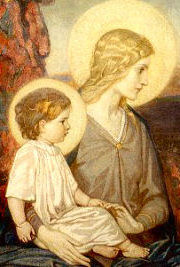 Today the Church celebrates the Solemnity of the Epiphany. "The Lord and ruler is coming; kingship is his, and government and power." With these words the Church proclaims that today's feast brings to a perfect fulfillment all the purposes of Advent. Epiphany, therefore, marks the liturgical zenith of the Advent-Christmas season. — Pius Parsch
Today the Church celebrates the Solemnity of the Epiphany. "The Lord and ruler is coming; kingship is his, and government and power." With these words the Church proclaims that today's feast brings to a perfect fulfillment all the purposes of Advent. Epiphany, therefore, marks the liturgical zenith of the Advent-Christmas season. — Pius Parsch
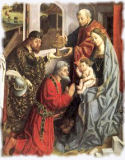 Epiphany is a large celebration, especially in Spanish speaking countries. Things look different around the household: the infant Jesus in the manger now has a small gold crown and is wearing regal robes. The figures of the wise men have reached Bethlehem, completing the nativity scene.
Epiphany is a large celebration, especially in Spanish speaking countries. Things look different around the household: the infant Jesus in the manger now has a small gold crown and is wearing regal robes. The figures of the wise men have reached Bethlehem, completing the nativity scene. 